
A new study by University College Cork shows poor insecticide policy resulted in thousands of unnecessary malaria cases.
Malaria is a serious infection spread by mosquitos. It is common in certain tropical regions, including large areas of Africa and Asia, Central and South America and parts of the Middle East. It is recommended to sleep under mosquito bed nets treated with insecticide; however, as a result of poor insecticide policy, this is often not adhered to.
The study, published in The Lancet, was conducted by Professor Gerry Killeen, AXA Research Chair in Pathogen Ecology at University College Cork (UCC) who analysed the results of a large-scale trial by Manfred Acrombessi and his team in Benin of mosquito bed nets treated with two insecticides, rather than just one to see how this could improve insecticide policy.
The important role of insecticide bed nets
Insecticide-treated bed nets are a form of personal protection that reduces the risk of malaria. They are used widely in countries affected by malaria. Insecticides are used for treating bed nets to kill mosquitoes, they work by repelling and killing mosquitoes.
The bed nets have been shown to reduce the death of children under five years from all causes by around 20%. High coverage of nets must be achieved to reduce the number of mosquitoes and reduce their length of life.
Improving insecticide policy could save lives
The large trial showed that mosquitoes have evolved to tolerate pyrethroids, which are a class of insecticides the world has relied on for preventing malaria. This has resulted in children sleeping under bed nets treated with this one active ingredient still getting malaria once a year on average, whilst their neighbours with dual-ingredient nets became ill at only half this rate.
Prof Killeen, who wrote the commentary with Dr Seynabou Sougoufara at Keele University, said this landmark paper also proves the point that such nets with two or more insecticides should have been approved for widespread use a long time ago.
“By using two or more active ingredients, such combination nets can decisively kill off insecticide-resistant mosquito variants before they have the opportunity to multiply, thus preventing resistance from becoming established across entire mosquito populations in the first place,” Prof Killeen commented.
“Crucially, the pyrethroids are exceptionally useful insecticides for public health purposes: Apart from being the standard treatment for bed nets, they are also the only insecticide class that can be safely dispersed into the air as a repellent vapour, to protect people living in malarious areas when they are awake and active outside the protective reach of their bed nets.
“It is unclear at present whether the pyrethroid resistance genie can be put back in the bottle but that’s exactly why our ongoing work in collaboration with the Ifakara Health Institute and Sokoine University of Agriculture in Tanzania is so important,” Prof Killeen said.
“With a view to the future, in the hope that new insecticide combinations can be used to select back the pyrethroid susceptibility traits that make it easier to protect people against mosquitoes and malaria, our team are currently surveying wild conservation areas in southern Tanzania, looking for malaria vector mosquitoes that have escaped insecticide pressure by feeding on wild animals rather than humans or livestock,” he said.








